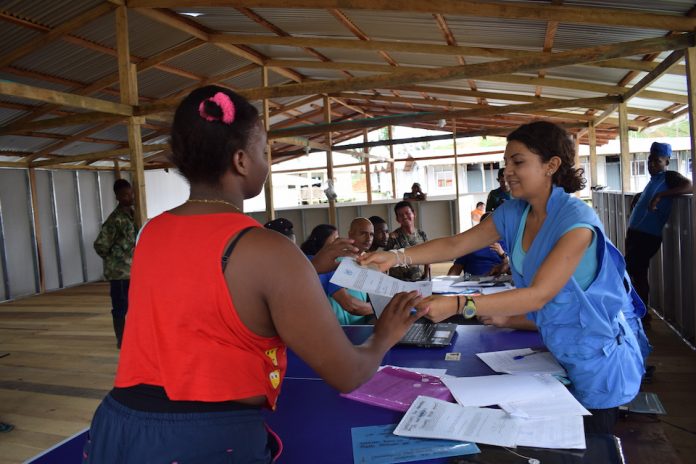Thank you very much. Let me begin by thanking the SRSG for his briefing. Thank you, Carlos. And I just want to say how grateful the UK is for the hard work of the Verification Mission. And I’m very pleased that the Council has extended your mandate for a further year to continue your valuable work. And I also want to welcome Foreign Minister Blum. It’s very good to see you, Minister.
We were very encouraged to hear of President Duque’s “new commitment to Colombia” to combat the serious impact of COVID-19. And I want to say to you that all of our countries are struggling from the social and economic effects of the virus. And we must seize this opportunity to build back better and create fairer, greener and more sustainable economies and societies. In Colombia, I think this will be impossible without the full and comprehensive implementation of the peace process as well. You are amongst friends, Minister, and you have our support today.
Mr President, we believe it is important to highlight some of the positive developments since our last discussion. Let me start with what might seem an unusual one: the FARC’s recent apology for the thousands of kidnappings that the group carried out and the suffering they caused, combined with their claim for of responsibility for the death of Álvaro Gómez Hurtado, was long overdue. It caused new pain and it caused suffering, but it was also a vindication of the very purpose of Colombia’s post-conflict transitional justice institutions. Truth and the acknowledgment of past crimes, however long ago, play a powerful role in a country’s ability to heal, and I’m sure play a powerful role in Colombia’s ongoing peacebuilding process.
More generally, we were pleased to see the continued progress made by those institutions of transitional justice institutions despite the challenge of COVID-19. Minister Blum, we look forward to hearing from your government regarding a future role for the Verification Mission in supporting Colombia in monitoring compliance with the sanctions of the Special Jurisdiction for Peace.
We also welcome the significant increase in the approval of protection measures of by the National Protection Unit. This will be some relief to the human rights defenders and social leaders facing constant threats, although additional resources are urgently required to continue this progress and to clear the backlog of requests. And these social leaders cannot afford to wait. We remain very concerned by the high rate of killings of community leaders, human rights defenders and other activists, as well as the worrying rise in multiple killings of civilians in recent months.
Mr President, it goes without saying that we condemn such violence and we condemn the armed groups responsible.
Now, a powerful deterrent to such killings is the bringing to justice of those who ordered them and of those who carried them out. We echo the call for all relevant Colombian institutions to support the Special Investigations Unit in the Attorney General’s office to ensure that those responsible for this violence are put on trial.
More broadly, as we’ve emphasised in previous statements before this Council, the establishment of a public policy to dismantle illegal armed groups is vital for bringing lasting peace across Colombia. And it’s encouraging that the National Commission on Security Guarantees met during the reporting period. This should now be followed by concrete and realistic proposals for action to be implemented as soon as possible.
And the United Kingdom also welcomes the recent approval by the Colombian Congress of the use of additional funds from mineral royalties to implement the PDETs and the progress being made in these areas. It’s imperative for the remaining roadmaps to be finalised and for the PDETs to be implemented in order to bring peace and stability to these regions. The state needs to increase and strengthen its presence in these rural areas to allow peace and prosperity fully to take hold.
Now, Mr President, in this anniversary month of the UNSCR 1325, let me echo the SRSG. As we recall, the Colombian peace process was notable for the importance it placed on the involvement of women and the mainstreaming of gender in the final agreement. In fact, I’d go so far as it’s an example for others in terms of peace processes. All that we know is that an inclusive peace process is far more likely to be a sustained, lasting and successful peace process. And we encourage all the parties in Colombia not to lose sight of this and to ensure the full implementation of the Comprehensive Programme for the Safeguards of Women Leaders and Human Rights Defenders.
Let me conclude by saying that we applaud the Colombian government and the Verification Mission for the progress that they have continued to achieve despite a global pandemic. While many significant challenges remain, the need for a lasting and sustainable peace is clear, and the UK will continue to support Colombia on this journey.
Thank you, Mr President.







